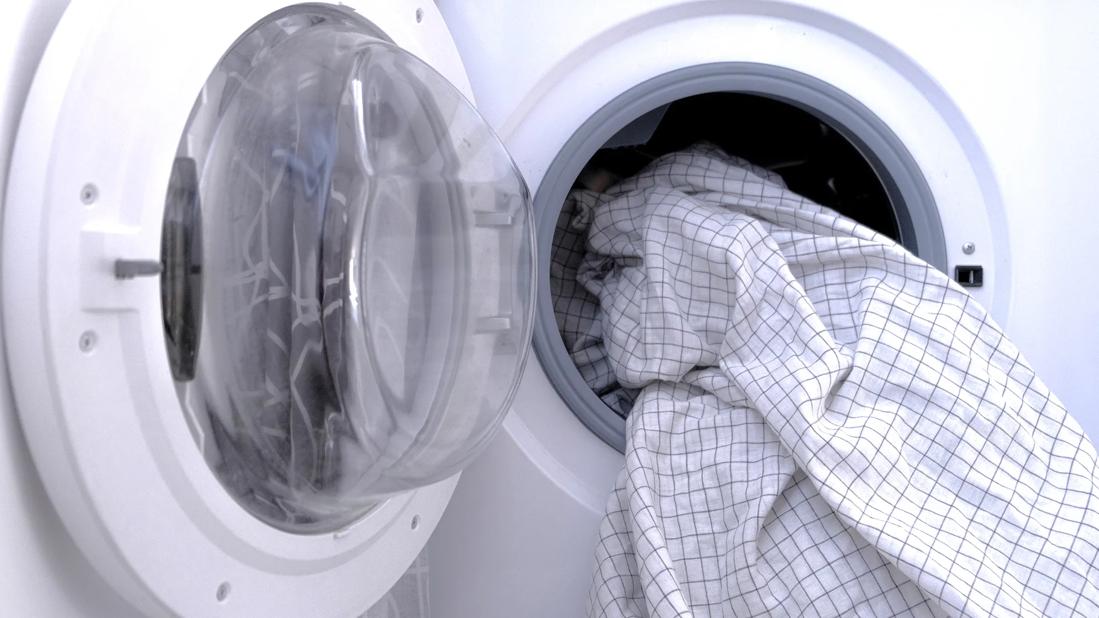You’re sharing your sheets with dust mites, bacteria and lots of dead skin, so you’ll want to keep your bedding fresh

Image content: This image is available to view online.
View image online (https://assets.clevelandclinic.org/transform/5a5cf1d1-2aec-4bba-9913-93011c12b4c1/sheets-washing-machine-1659670510)
Clean sheets hanging out of dryer
The reality is, you’re never really sleeping alone. Joining you in bed are countless dust mites and bacteria, not to mention lots of your own dead skin cells. And if you’ve been outside at all, you’re likely bringing allergens into your bed, too.
Advertisement
Cleveland Clinic is a non-profit academic medical center. Advertising on our site helps support our mission. We do not endorse non-Cleveland Clinic products or services. Policy
Medical experts advise washing your sheets at least once a week, says dermatologist Sean McGregor, DO. Pillows and blankets don’t need to be washed as often, but cleaning them at least every few months limits the amount of germs and other microscopic organisms you face when you’re asleep. Plus, you may want to wash these items more often during hotter months, especially if you have pets.
We spend a lot of time in bed, and that means our sheets become a general breeding ground for:
According to Dr. McGregor, the average person sheds a gram and a half of keratinocytes (largely made up of the protein keratin) daily. Visually speaking, that’s almost half a teaspoon full of dead skin.
“Any kind of friction will chafe off the outer layer of your skin cells,” he says, “so, a lot of it is shed when you’re making contact with your sheets in your bed at night.”
Those dead skin cells resting in your sheets and on your mattress and pillows act as a breeding ground for bacteria.
“Bacteria love skin so much that there are actually more bacterial organisms in our bodies than we have cells,” he adds. And the skin is one of bacteria’s most commonly inhabited areas.
Advertisement
Exposing your skin to all the invisible organisms in your sheets can cause problems like rashes and eczema. And how often you need to wash or change your sheets becomes even more important when:
Your sheets might seem clean on the surface, but looks can be deceiving. Sure signs you should wash them include:
Washing or changing your sheets at least once a week provides you a safe place to rest without having to worry about what’s crawling on your skin. But Dr. McGregor says even washing your sheets every other week provides a number of benefits, like:
So, what does it take to keep your sheets clean and free of debris? Dr. McGregor provides these tips:
It’s easy to think of washing sheets and keeping fresh bedding as a chore. But if you keep up with it, it starts to feel great when you have a fresh, clean bed to slide into.
Advertisement
“The washing process fluffs your pillow and distributes your blanket’s filling more evenly,” Dr. McGregor notes. “That’s helpful for making your pillows and blankets as comfortable as possible for their whole life.”
Advertisement

Sign up for our Health Essentials emails for expert guidance on nutrition, fitness, sleep, skin care and more.
Learn more about our editorial process.
Advertisement
Bathing once a day is the general guidance, but you could also have reasons to soap up twice a day or not at all
You may notice itching, redness and swelling after wearing or using laundered items
We don’t fully understand how cleanliness impacts immune system development, but we do know that preventing illness is important
An icy blast may boost mental clarity, increase circulation and give your skin a little glow — but don’t overdo it
This olive oil-based soap is generally mild and safe when diluted
It’s a wash — when you bathe is a personal preference
Try turning the heat down on the water and opting for a moisturizing soap
Research doesn’t show a link between the personal hygiene product and breast cancer
Although it could be used as a moisturizer, this new trend is not recommended
Communicating clear limits helps protect your time, energy and emotional well-being
High cholesterol can be genetic, but testing and treatment can lower your heart disease risk